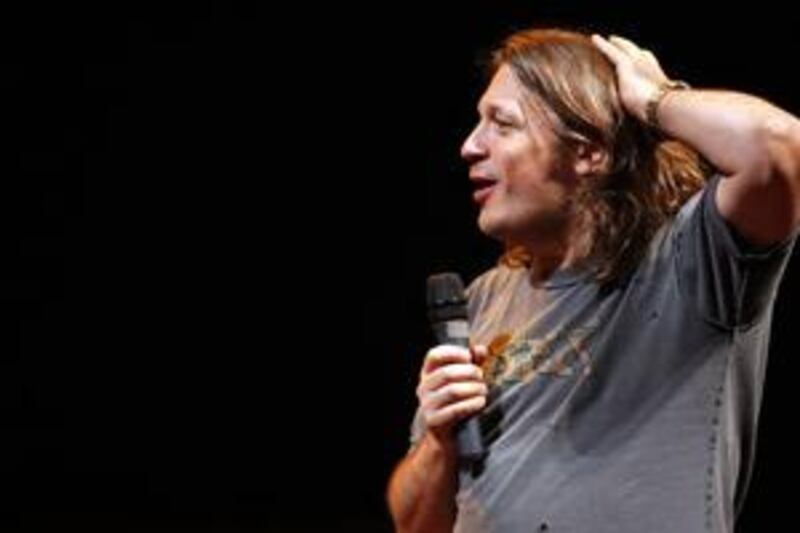The world's greatest celebration of vanity, eccentricity and the unruliness of the creative spirit, the Edinburgh Fringe, starts tomorrow. The programme is available to download at www.edfringe.com and I recommend that you take a look. If nothing else, it offers a salutary brush with the business they call show's swarming underside, a mass of desperate ploys, cracked ambitions and vulnerable egos.
It's a world of aggressive tweeness, as in Andrew Stanley's Comedy Mish Mash (tagline: "Like biscuits? Like people who like biscuits?"), and scary obsession. "Yearning for a violent death?" enquires the ad for Sam Boardman-Jacobs' dance show Soft Murders, the experience of which is proudly described as: "Like being inside a Francis Bacon painting." Thanks, I'll pass. It almost goes without saying that the majority of the shows set to play in the Scottish capital this year will be dreck; they always are. But that still leaves more worthwhile stuff than you could see if you spent the entire month dashing from theatre to theatre. There are several thousand shows at this year's Fringe. The programme alone runs to nearly 300 densely printed pages, covering everything from stand-up comedy to interpretative dance, and there will be hundreds more late arrivals and buskers and opportunistic show-offs to factor in on top of that.
Overlap, inevitably, is rife: there are three Alice in Wonderland shows this year, two Treasure Islands, two musicals based on Jeeves and Wooster, two productions of Sarah Kane's Crave - though in fairness the script's stage directions are so minimal that you tend to get a new show each time it's staged. Oh, and there are three pieces based on The Canterbury Tales; I can't remember how many there were the year I ended up acting in a poorly advised Antonin Artaud-via-Frantic Assembly version (with patacake mime segments; don't ask). But, to our chagrin, we weren't alone.
In this foment of activity, the struggle for attention is ferocious. It isn't unusual for the cast of a show to outnumber its audience, which goes exceedingly hard for the stand-ups. Distrait critics have to plunge through five or more shows a day and still find themselves clobbered with remorse at the ones that got away. Self-publicists cram the Royal Mile working every ruse they can think of to press a flyer into your hand.
Take another look at the brochure: it's a Galapagos island of misshapen oddments, each ruthlessly adapted to squeeze out its neighbours. Who could fail to double-take at the magnificent flyer for Hitler Moustache, the new show by the British comic Richard Herring? A wrathful Herring's hair and face fuzz are styled to make him look like the Fuhrer, and the title of his show is displayed behind him in that quintessentially Nazi typeface, Fraktur: it's a viral masterpiece.
In a strange kerfuffle with The Guardian over whether his routine was actually racist (and early audiences say it isn't), Herring claimed he was simply trying to reclaim the toothbrush moustache for comedy - Chaplin had it first, after all. One suspects he just wanted an excuse to make that poster. Elsewhere, several shows seem to be pursuing their strains of cynical populism into the abyss. Take the zany musicals, for instance: A-Team: The Musical ("With guns, explosives and power ballads"), Facebook: The Musical ("Just how far can a poke war go?"), Gingers! The Musical ("Eight gingers, one room..."). These, one suspects, are shows that could only thrive in the Fringe's overheated ecosystem.
In the drama section, meanwhile, it used to be a standing joke that about a third of the shows would advertise themselves as being "darkly comic". The reasoning, presumably, is that this designation suggests a safe bet, something that covers all the bases. But of course, good dark comedy is hard to do and bad dark comedy is loathsome. So the Fringe has proven year after year. This time around, I'm intrigued to note, "darkly comic" seems to have slipped off the menu. Could this be natural selection in action?
Perhaps not. "I am Leatherface! The man with the chainsaw! I want to order pizza!", proclaims the blurb for Leatherface, a German play "based on true events". Some things never change. Do I miss it? You bet I do.










